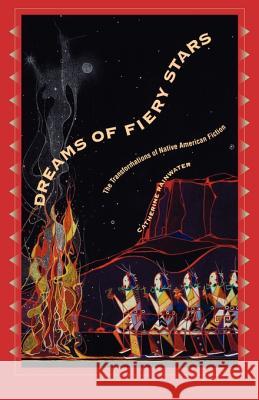Dreams of Fiery Stars: The Transformations of Native American Fiction » książka
Dreams of Fiery Stars: The Transformations of Native American Fiction
ISBN-13: 9780812216820 / Angielski / Miękka / 1999 / 240 str.
Selected by Choice magazine as an Outstanding Academic Book, 1999 "Dreams of Fiery Stars is an original, substantial, and well-conceived contribution to the field of Native American studies. Rainwater's book finds its targets and explodes much if not most of the nonsense that has been written about Native American novels and, by extension, Native American literature, art, dance, drama, and tradition. Rainwater refocuses attention on the evolution of and diversity among Native writers. Her discussion is a sophisticated, well-researched, and much needed addition to the field."--Paula Gunn Allen, University of California, Los Angeles "One of the most sophisticated studies to date of Native Amercan fiction. . . . The writing is lucid and the argument coherent."--Choice Since the 1968 publication of N. Scott Momaday's House Made of Dawn, a new generation of Native American storytellers has chosen writing over oral traditions. While their works have found an audience by observing many of the conventions of the mainstream novel, Native American written narrative has emerged as something distinct from the postmodern novel with which it is often compared. In Dreams of Fiery Stars, Catherine Rainwater examines the novels of writers such as Momaday, Linda Hogan, Leslie Marmon Silko, Gerald Vizenor, and Louise Erdrich and contends that the very act of writing narrative imposes constraints upon these authors that are foreign to Native American tradition. Their works amount to a break with--and a transformation of--American Indian storytelling. The book focuses on the agenda of social and cultural regeneration encoded in contemporary Native American narrative, and addresses key questions about how these works achieve their overtly stated political and revisionary aims. Rainwater explores the ways in which the writers "create" readers who understand the connection between storytelling and personal and social transformation; considers how contemporary Native American narrative rewrites Western notions of space and time; examines the existence of intertextual connections between Native American works; and looks at the vital role of Native American literature in mainstream society today. Catherine Rainwater is Associate Professor of English at St. Edward's University. She is coeditor with William J. Scheick of Contemporary American Women Writers: Narrative Strategies.
Selected by Choice magazine as an Outstanding Academic Book, 1999"Dreams of Fiery Stars is an original, substantial, and well-conceived contribution to the field of Native American studies. Rainwater's book finds its targets and explodes much if not most of the nonsense that has been written about Native American novels and, by extension, Native American literature, art, dance, drama, and tradition. Rainwater refocuses attention on the evolution of and diversity among Native writers. Her discussion is a sophisticated, well-researched, and much needed addition to the field."--Paula Gunn Allen, University of California, Los Angeles"One of the most sophisticated studies to date of Native Amercan fiction. . . . The writing is lucid and the argument coherent."--ChoiceSince the 1968 publication of N. Scott Momaday's House Made of Dawn, a new generation of Native American storytellers has chosen writing over oral traditions. While their works have found an audience by observing many of the conventions of the mainstream novel, Native American written narrative has emerged as something distinct from the postmodern novel with which it is often compared.In Dreams of Fiery Stars, Catherine Rainwater examines the novels of writers such as Momaday, Linda Hogan, Leslie Marmon Silko, Gerald Vizenor, and Louise Erdrich and contends that the very act of writing narrative imposes constraints upon these authors that are foreign to Native American tradition. Their works amount to a break with--and a transformation of--American Indian storytelling.The book focuses on the agenda of social and cultural regeneration encoded in contemporary Native American narrative, and addresses key questions about how these works achieve their overtly stated political and revisionary aims. Rainwater explores the ways in which the writers "create" readers who understand the connection between storytelling and personal and social transformation; considers how contemporary Native American narrative rewrites Western notions of space and time; examines the existence of intertextual connections between Native American works; and looks at the vital role of Native American literature in mainstream society today.Catherine Rainwater is Associate Professor of English at St. Edward's University. She is coeditor with William J. Scheick of Contemporary American Women Writers: Narrative Strategies.











